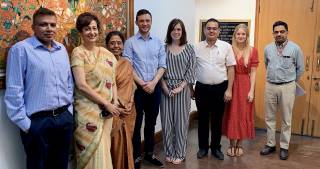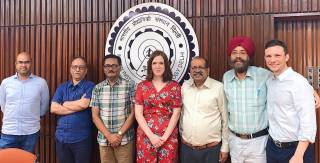New PhD projects awarded strengthen cross-continent collaborations with India
19 July 2020
UCL Institute of Healthcare Engineering has newly established two PhD studentships that will be co-led by UCL and collaborators in AIIMS and IIT, Delhi.
The projects address global health challenges around motor neuron disease and diabetic foot ulcers, posing healthcare engineering solutions that could significantly impact treatment pathways and patient care. Both projects pull together interdisciplinary teams from engineering and clinical backgrounds to tackle this.
The projects are funded through the Engineering and Physical Sciences Research Council (EPSRC).
Designing a 3D printed bespoke neck collar with embedded sensors for real-time monitoring in people living with Motor Neurone Disease (plwMND)
Motor Neurone Disease (MND) is a rapidly progressive and fatal neurodegenerative disease for which there is no cure. MND affects up to 5,000 adults in the UK at any one time. The prognosis is extremely poor with many individuals experiencing profound weakness of the neck muscles at some stage. The resulting head drop can severely impact quality of life including breathing, comfort, eating and social interactions.
Neck collars are commonly used to support individual’s head drop and compensate for muscle weakness. Off-the-shelf collars are typically designed for patients with trauma and based on one- design-fits-all concept. This ‘one-size’ approach has limitations due to the extreme variables in MND’s impact on individuals’ anatomy throughout disease progression.
This project aims to 3D print personalised neck collars for individuals, providing more effective support. The design can be tailored and adjusted further over time to reflect any changes to anatomy with disease progression. The collar will also be embedded with pressure sensors to allow for real-time monitoring.
The project will also have a particular impact in India, where 1 in 50,000 people are diagnosed with MND every year. Through working with AIIMS and IIT-Delhi the team aim to combat the higher costs of traditional neck collars which keep them inaccessible to the majority of patients with low socio-economical background, and find an accessible design process.
This project will be led by Dr Deepak Kalaskar (UCL Division of Surgery and Interventional Science), Dr Nikhil Sharma (Queen Square Institute of Neurology), Dr Ryo Torii (UCL Mechanical Engineering), Dr Deepak Joshi (Centre for Biomedical Engineering, IIT-Delhi), Prof U Singh (AIIMS, Delhi).
Embedded self-powered haptic sensor arrays for preventing diabetic foot ulcers
Diabetic foot ulcers are a global healthcare problem and lead to significant patient morbidity, and mortality (from systemic sepsis), particularly in LMICs. Non-healing of these ulcers poses a high risk of a major limb amputation, and a considerable social and economic burden to the individual and state.
This is a major drain on healthcare services in India, with a particularly high proportion of individuals that develop diabetic foot ulcers becoming infected and requiring amputation (50% become infected requiring hospitalisation and 20% need amputation). In fact, it has been found that diabetic foot ulcers contribute to a staggering 80% of all non-traumatic amputations in India annually.
Early detection of ulcer-prone areas of the food can prevent the ulcers from occurring, and therefore also prevent the need for future amputations. The majority of these cases are preventable when screening for foot complications occurs, coupled with education of patients and healthcare providers around the risks and signs – leading to early detection and intervention.
This project proposes inexpensive, self-powered pressure sensors that can monitor cumulative pressure over time, and alert when ulcers may be about to form before they escalate. The sensors can be embedded into everyday footwear and provide a cost-effective approach that will have particular impact in low-resource settings.
This project will be led by Prof Manish Tiwari (UCL Mechanical Engineering), Prof Shervanthi Homer-Vanniasinkam (UCL Mechanical Engineering), Prof Rui Loureiro (UCL Aspire CREATe) and Prof Kolin Paul (Computer Science, IIT-Delhi).
 Close
Close



